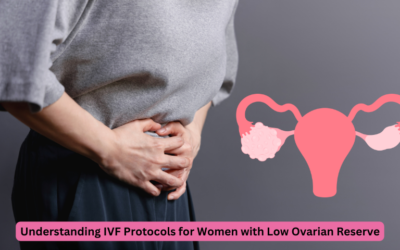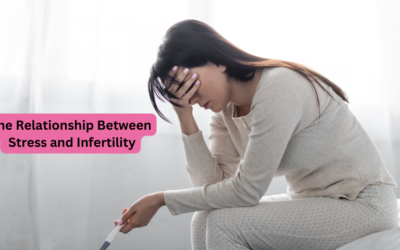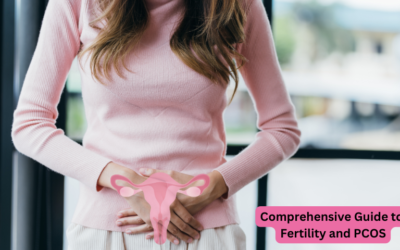Low AMH (Anti-Müllerian Hormone) levels indicate a reduced ovarian reserve, which can impact a woman’s fertility. While low AMH levels are often associated with a decreased chance of conception, it’s important to note that they do not mean a woman cannot get pregnant. There are various ways to optimize fertility, even with low AMH levels, by focusing on improving overall reproductive health, exploring fertility treatments, and making specific lifestyle changes.
In this blog, we will discuss tips and strategies that can help improve fertility for women with low AMH levels.
- Understand your AMH levels.
- Maintain a balanced and nutritious diet.
- Consider supplements for fertility support.
- Manage stress.
- Explore fertility treatments.
- Maintain a healthy weight.
- Avoid harmful habits.
- Consult a fertility specialist early.
- Track your ovulation.
- Stay positive and patient.
1. Understand your AMH levels
The first step in improving fertility is to understand what low AMH levels mean. AMH is a hormone produced by the small follicles in the ovaries. Low levels of AMH indicate that the number of remaining eggs is limited. However, AMH levels do not reflect egg quality, which is equally important for conception.
By regularly monitoring AMH levels and other fertility indicators, you and your fertility specialist can determine the best path forward.
2. Maintain a balanced and nutritious diet
A healthy, nutrient-rich diet plays a crucial role in improving fertility. Women with low AMH levels can benefit from consuming foods that support hormone balance, egg health, and overall reproductive function. Include the following in your diet:
- Antioxidant-rich foods: Berries, leafy greens, and nuts contain antioxidants that protect eggs from oxidative stress.
- Healthy fats: Omega-3 fatty acids found in fish, flaxseeds, and walnuts help maintain hormone levels and improve ovarian function.
- Protein from plants: Consider plant-based protein sources like beans, lentils, and chickpeas, as some studies suggest they may positively affect fertility compared to animal-based proteins.
- Folic acid: Foods rich in folic acid, such as spinach and avocados, are essential for reproductive health.
3. Consider supplements for fertility support
In addition to a balanced diet, certain supplements can help enhance fertility. Consult your doctor about the following supplements, which may benefit women with low AMH levels:
- CoQ10: Coenzyme Q10 improves egg quality and mitochondrial function in the eggs.
- DHEA: Dehydroepiandrosterone (DHEA) supplementation may support ovarian reserve and improve egg quality.
- Vitamin D: Adequate levels of Vitamin D are linked to better fertility outcomes. A simple blood test can determine if you need a supplement.
- Myo-Inositol: This supplement may help regulate ovarian function, especially in women with Polycystic Ovary Syndrome (PCOS).
Always consult your healthcare provider before starting any new supplements.
4. Manage stress
Chronic stress can negatively affect fertility and hormone balance. When experiencing stress, your body produces cortisol, which can interfere with reproductive hormones like progesterone and estrogen. Practicing stress-reducing techniques can support fertility:
- Mindfulness and Meditation: Daily meditation can reduce stress and improve overall well-being.
- Yoga and Exercise: Gentle exercises such as yoga, walking, and swimming help manage stress while promoting blood circulation to the reproductive organs.
- Counseling or Support groups: Consider talking to a counselor or joining a fertility support group to manage the emotional aspects of trying to conceive with low AMH levels.
5. Explore fertility treatments
If natural methods do not result in pregnancy, fertility treatments can offer hope. Women with low AMH levels may consider several options, including:
- In Vitro Fertilization (IVF): IVF is one of the most effective treatments for women with low AMH. Although the number of eggs retrieved may be lower, IVF can still lead to a successful pregnancy by selecting the best-quality eggs.
- Mini IVF (Minimal Stimulation IVF): For women with low ovarian reserve, Mini IVF may be recommended. This treatment involves less medication, reducing the risk of overstimulation while still retrieving eggs.
- Egg donation: In cases where egg quality or quantity is extremely low, using donor eggs can provide a successful path to pregnancy. Many women with low AMH have achieved parenthood through this method.
6. Maintain a healthy weight
Both being overweight and underweight can negatively affect fertility. Maintaining a healthy body mass index (BMI) can support hormone balance and improve your chances of conceiving. Here are some tips:
- Regular physical activity: Engage in moderate exercise to maintain a healthy weight, but avoid excessive or intense workouts, which can negatively affect reproductive health.
- Balanced diet: A well-rounded diet that includes all necessary food groups helps maintain your ideal weight and supports hormonal balance.
7. Avoid harmful habits
Certain lifestyle habits can further reduce fertility in women with low AMH levels. To improve your chances of conception, avoid the following:
- Smoking: Smoking has been shown to decrease egg quality and accelerate ovarian aging. Quitting smoking is essential for improving fertility.
- Alcohol and Caffeine: Limit alcohol intake and reduce caffeine consumption, as both can interfere with hormonal balance and fertility.
- Exposure to environmental toxins: Minimize exposure to toxins found in household cleaners, plastics, and cosmetics, as they may disrupt hormone function and affect reproductive health.
8. Consult a fertility specialist early
Women with low AMH levels should consult a fertility specialist early in their journey to conception. The sooner you explore your options, the higher your chances of success. A fertility expert can assess your overall reproductive health, suggest treatments, and monitor your progress.
9. Track your ovulation
Accurate tracking of ovulation is essential when trying to conceive, especially for women with low AMH levels. By identifying the most fertile days of your cycle, you can increase your chances of pregnancy. Methods to track ovulation include:
- Ovulation Predictor Kits (OPKs): These kits detect the surge in luteinizing hormone (LH) that occurs before ovulation.
- Basal Body Temperature (BBT): Charting your BBT can help pinpoint ovulation by showing a rise in temperature after ovulation occurs.
- Cervical mucus monitoring: Observing changes in cervical mucus consistency can also provide clues about your most fertile days.
10. Stay positive and patient
While low AMH levels can make the path to pregnancy more challenging, many women with low AMH have successfully conceived and had healthy pregnancies. It’s important to stay positive, maintain a healthy lifestyle, and seek support from fertility specialists and loved ones throughout your journey.
Conclusion
Improving fertility with low AMH levels requires a comprehensive approach that includes a healthy lifestyle, stress management, and working closely with a fertility specialist. By making informed decisions, adopting fertility-boosting habits, and exploring treatment options, women with low AMH can enhance their chances of conceiving and achieving their dream of parenthood.At Shukan Hospital and IVF Centre, we specialize in personalized fertility treatments for women with low AMH and other fertility challenges. Contact us today to learn more about how we can support you on your journey to parenthood.
Author bio
Dr. Prakash Patel
He is a highly respected Infertility and IVF Specialist with an extensive medical career spanning over two decades. As the Director of Shukan Hospital & IVF Centre, he has dedicated his life to helping couples achieve their dreams of parenthood. He is renowned for his expertise in advanced laparoscopic surgeries and has successfully managed numerous complex cases involving recurrent miscarriages and recurrent IVF failures. His proficiency in high-risk pregnancy management and advanced IVF treatments makes him a trusted name in the field of reproductive medicine.
His approach to patient care is deeply compassionate, combining his vast clinical knowledge with a commitment to personalized treatment. He holds prestigious certifications from leading medical institutions in France and Croatia, reflecting his dedication to staying at the forefront of medical advancements. With memberships in notable organizations like FOGSI and ISAR, He is recognized both nationally and internationally for his contributions to gynecology and reproductive health.
Under his leadership, Shukan Hospital & IVF Centre has become one of the premier fertility centers in Gujarat, known for its state-of-the-art facilities and patient-centered care. His outstanding work has earned him several accolades, including the My FM Achiever Award, further cementing his reputation as a leading specialist in his field.
FAqs
Can lifestyle changes alone improve fertility in women with low AMH levels?
While lifestyle changes such as a healthy diet, stress management, and exercise can improve overall reproductive health, they may not fully restore fertility. However, these changes can enhance the chances of conception when combined with fertility treatments.
How does age affect AMH levels and fertility?
AMH levels naturally decline with age, especially after the mid-30s. As a woman ages, the number of eggs in the ovaries decreases, which can affect fertility. Women with low AMH may face more challenges, but age is also a key factor in determining treatment options.
Is IVF the only fertility treatment option for women with low AMH?
IVF is a popular treatment for women with low AMH, but other options like ovulation induction, Intrauterine Insemination (IUI), and egg freezing may also be explored depending on individual circumstances and the woman’s age.
How accurate are AMH tests in predicting fertility?
AMH levels give insight into ovarian reserve but do not directly predict a woman’s ability to conceive. Other factors, including egg quality, age, and overall health, play a significant role in fertility.
Can acupuncture or alternative therapies help improve fertility in women with low AMH?
Some women turn to alternative therapies like acupuncture, which may improve blood flow to the reproductive organs and reduce stress. While evidence on their effectiveness is mixed, these therapies can complement medical treatments.
Does having low AMH mean that menopause is near?
Low AMH levels are linked to reduced ovarian reserve, but they do not directly indicate that menopause is imminent. Menopause is influenced by several other factors, including genetics and overall reproductive health.
How does sperm quality affect fertility in cases of low AMH?
While low AMH primarily concerns egg quantity, sperm quality is equally crucial for conception. Poor sperm health can further complicate fertility in women with low AMH, which is why a comprehensive fertility evaluation includes both partners.
Blogs related Female Infertility
Understanding IVF Protocols for Women with Low Ovarian Reserve
In the field of reproductive medicine, one of the significant challenges we face is treating women with low ovarian reserve. As an expert in IVF (In...
The Relationship Between Stress and Infertility
Infertility is a challenge that affects millions of couples worldwide, often bringing with it a rollercoaster of emotions. While the physical...
Comprehensive Guide to Fertility and PCOS
Polycystic Ovary Syndrome (PCOS) is one of the most common endocrine disorders affecting women of reproductive age. Characterized by irregular...




